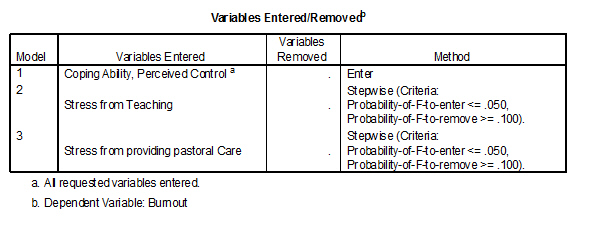Recent research has shown that lecturers are among the most stressed workers. A researcher wanted to know exactly what it was about being a lecturer that created this stress and subsequent burnout. She recruited 75 lecturers and administered several questionnaires that measured: Burnout (high score = burnt out), Perceived Control (high score = low perceived control), Coping Ability (high score = low ability to cope with stress), Stress from Teaching (high score = teaching creates a lot of stress for the person), Stress from Research (high score = research creates a lot of stress for the person), and Stress from Providing Pastoral Care (high score = providing pastoral care creates a lot of stress for the person). The outcome of interest was burnout, and Cooper's (1988) model of stress
indicates that perceived control and coping style are important predictors of this variable. The remaining predictors were measured to see the unique contribution of different aspects of a lecturer's work to their burnout. What analysis has been carried out?
A. Multilevel model
B. Reliability analysis
C. Factor analysis
D. Hierarchical multiple regression
Answer: D
You might also like to view...
When teachers look at the potential for implementing assistive technology into their classroom by focusing on topics such as vision, hearing, communication, mobility, cognition, and motor control, what overall concept is being analyzed?
a. modifications b. accommodations c. functional capabilities d. IEP
A wraparound plan
a. is implemented by trained specialists b. addresses multiple life domains c. focuses on transition to less restrictive educational environments d. does not include educational programs or services e. is implemented exclusively in home settings
A newborn's auditory system
a. regresses shortly after birth
b. may have developed so well that an unborn child can hear his mother's voice.
c. is better developed than his sight system.
d. is rarely affected prenatally by a mother's health.
Mr. Romanowski gives an essay a C. Then he realizes that the essay is not Michael's— it is Michelle's. A grade of C is not what Mr. Romanowski expects of Michelle, so he takes another look and finds some ideas in the essay that he didn't notice before
Now he sees it as a B essay and assigns Michelle a B. Michelle is benefitting from: a) formative evaluation. b) backward planning. c) clang. d) a halo effect.